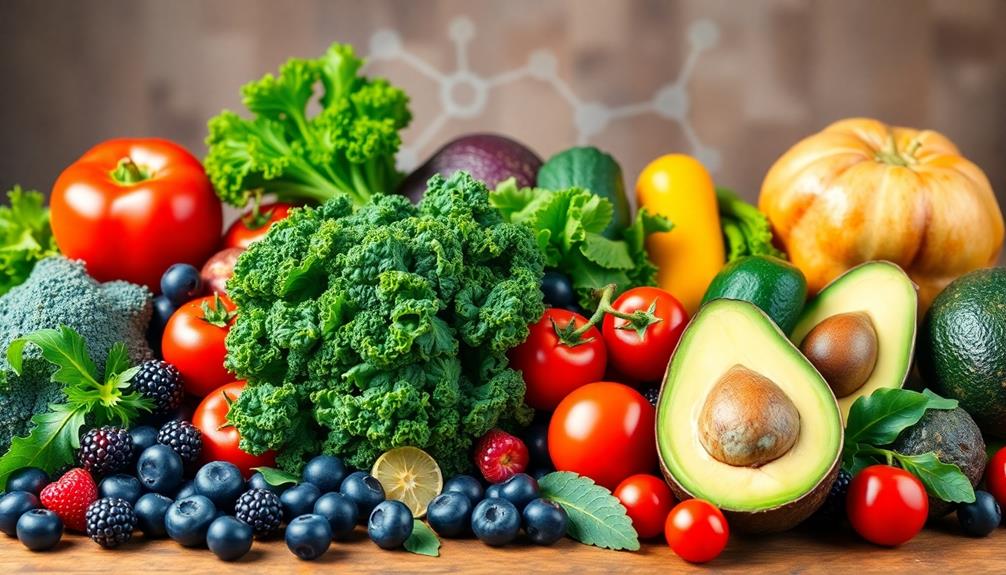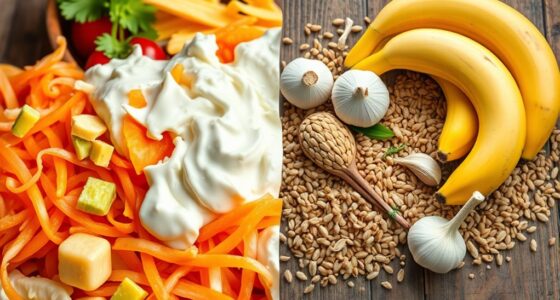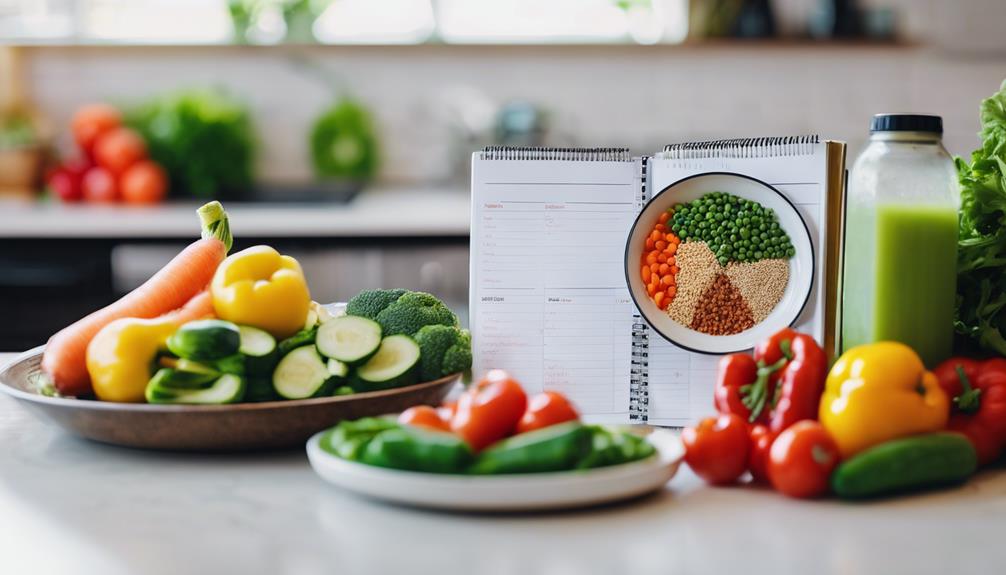The science of food synergy highlights how certain combinations can greatly boost your nutrition. For instance, pairing non-heme iron sources like spinach with vitamin C-rich foods can enhance absorption by up to 300%. Similarly, adding healthy fats to carotenoid-rich vegetables can increase nutrient uptake by 3-4 times. Turmeric, when combined with black pepper and healthy fats, sees a 2000% increase in bioavailability of curcumin. Emphasizing these nutrient pairings can lead to better overall health. You'll discover even more beneficial combinations that can transform your meals into nutritional powerhouses.
Key Takeaways
- Food synergy enhances nutrient absorption, lowering the risk of chronic diseases through strategic food combinations.
- Pairing non-heme iron with vitamin C-rich foods can boost absorption by up to 300%.
- Healthy fats significantly increase the absorption of carotenoids, improving overall nutrient intake.
- Cooking methods like roasting and sautéing enhance the bioavailability of carotenoids and other nutrients.
- The Mediterranean diet promotes whole foods and nutrient synergy, reducing inflammation and chronic disease risk.
Understanding Food Synergy
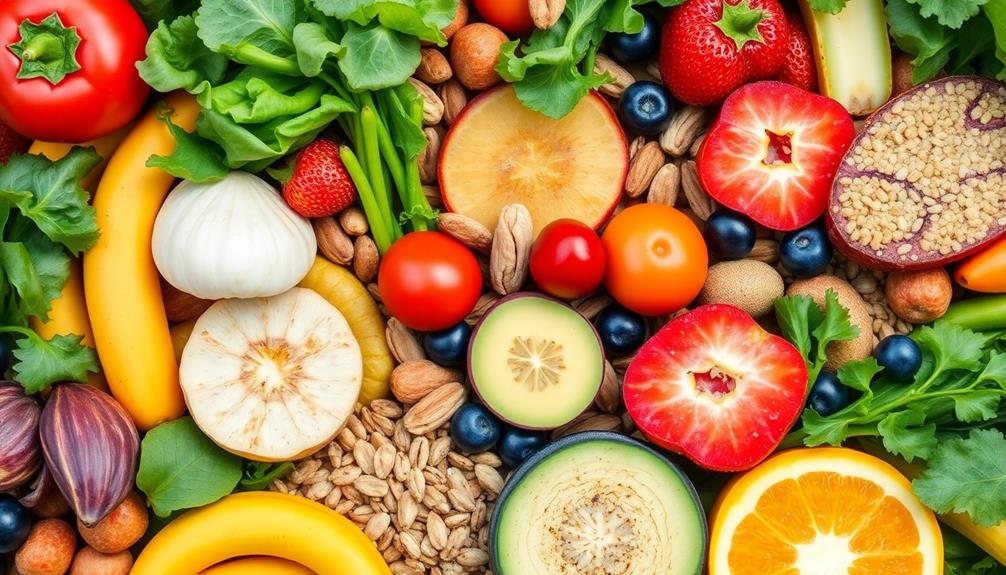
In understanding food synergy, you discover how certain combinations of foods can greatly enhance your nutrient absorption and overall health.
Food synergy refers to the phenomenon where nutritional interactions between foods lead to improved health benefits beyond what individual foods can provide. For instance, pairing spinach with citrus fruits considerably boosts non-heme iron absorption by up to 67% due to the presence of vitamin C.
Similarly, enjoying dishes like Red-Braised Pork Belly with steamed rice can provide a balanced meal that enhances your overall nutrient intake.
Additionally, carotenoids, which are found in carrots and leafy greens, require healthy fats for ideal absorption. When you drizzle olive oil over a salad, you enhance the benefits of these powerful compounds.
Furthermore, combining turmeric with black pepper and healthy fats can dramatically increase the bioavailability of curcumin, maximizing its anti-inflammatory and antioxidant effects.
Emphasizing these food combinations in your diet can lead to greater long-term health benefits, including a reduced risk of chronic diseases.
Instead of relying solely on isolated nutrient supplements, focus on creating meals that leverage food synergy. By understanding these concepts, you can make informed choices that will elevate your nutritional intake and overall well-being.
Benefits of Nutrient Pairings
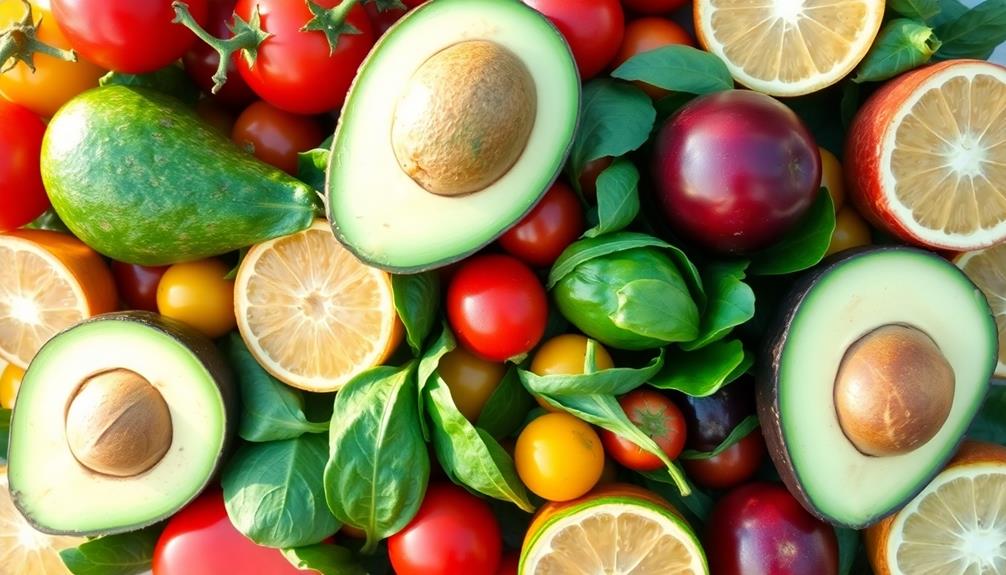
When you pair certain foods, you can greatly enhance nutrient absorption and boost your overall health. For instance, combining Yeduba Wat with a side of citrus can elevate your meal's nutritional profile.
Additionally, incorporating whole grains with legumes can provide a complete protein source, further increasing the benefits of your diet. For example, combining spinach with citrus fruits can increase iron uptake, while adding healthy fats to carrots improves the absorption of essential nutrients.
These strategic pairings not only improve your nutrient intake but also serve as effective strategies for disease prevention.
Enhanced Nutrient Absorption
Nutrient pairings can transform the way your body absorbs essential vitamins and minerals. For instance, pairing non-heme iron sources like spinach with vitamin C-rich foods, such as citrus fruits, can boost iron absorption by up to 300%.
Additionally, incorporating traditional Brazilian dishes that combine various ingredients can enhance nutrient intake. Similarly, consuming carotenoid-rich foods like carrots with healthy fats, like olive oil, can increase the absorption of fat-soluble vitamins by 2.5 to 5 times.
Moreover, combining turmeric with black pepper and healthy fats can enhance curcumin bioavailability by an astounding 2000%. This makes it far more effective for its anti-inflammatory benefits.
You can also improve gut health and nutrient absorption by enjoying yogurt with bananas, as the probiotics in yogurt work hand-in-hand with the prebiotics in bananas to support beneficial gut bacteria.
Disease Prevention Strategies
Harnessing the power of food synergy can be a game changer in disease prevention. By strategically combining nutrients, you can amplify their health benefits. For instance, pairing vitamin C-rich foods with non-heme iron sources like spinach greatly enhances iron absorption, which is vital for vegetarians and others seeking ideal iron intake.
Additionally, enjoying a dish like Pasta With Tomato Sauce can provide a delicious way to incorporate more lycopene from tomatoes, which, when combined with healthy fats like olive oil, boosts lycopene's bioavailability, potentially reducing your risk of cardiovascular disease.
Similarly, combining lycopene from tomatoes with healthy fats like olive oil boosts lycopene's bioavailability, potentially reducing your risk of cardiovascular disease. When you mix antioxidant-rich foods—like blueberries and strawberries—you enhance cognitive function and reduce oxidative stress, supporting your mental health.
Incorporating turmeric with black pepper and healthy fats improves the absorption of curcumin, known for its anti-inflammatory properties that may help prevent chronic diseases.
Additionally, meals like quinoa and black beans offer synergistic food combinations that deliver a complete amino acid profile, promoting muscle health and overall nutrient adequacy.
Iron and Vitamin C Boost
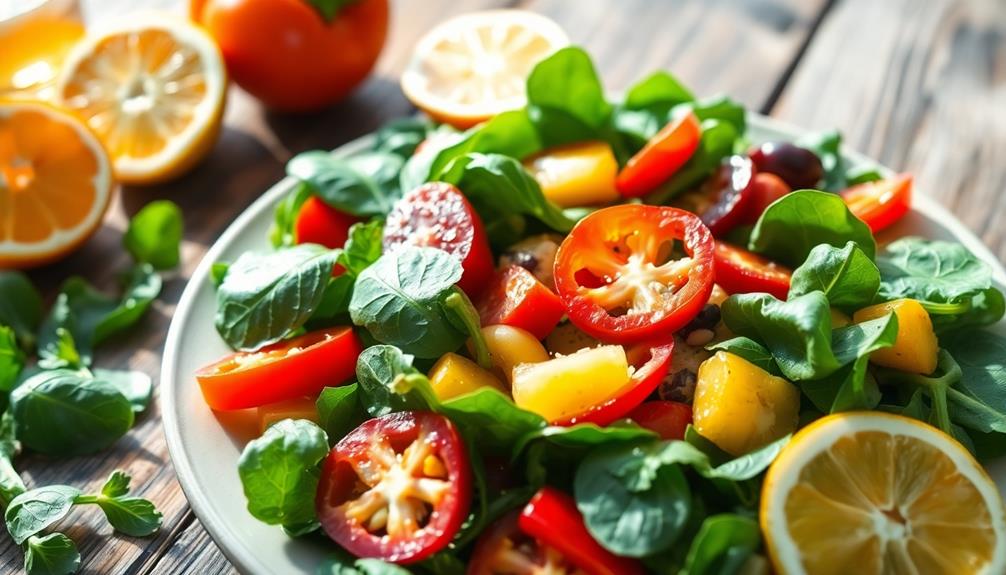
Many people don't realize the powerful connection between iron and vitamin C in boosting nutrient absorption. When you consume non-heme iron from plant sources like spinach or legumes, pairing it with vitamin C-rich foods can markedly enhance its absorption. Vitamin C helps convert non-heme iron into a more soluble form, thereby increasing its bioavailability. To maximize your iron intake, aim for at least 50 mg of vitamin C with your meals.
Here's a quick reference table showcasing some effective combinations:
| Iron-Rich Food | Vitamin C Source |
|---|---|
| Spinach | Orange slices |
| Lentils | Bell peppers |
| Tofu | Broccoli |
| Beans | Tomatoes |
| Chickpeas | Kiwi |
Carotenoids and Healthy Fats
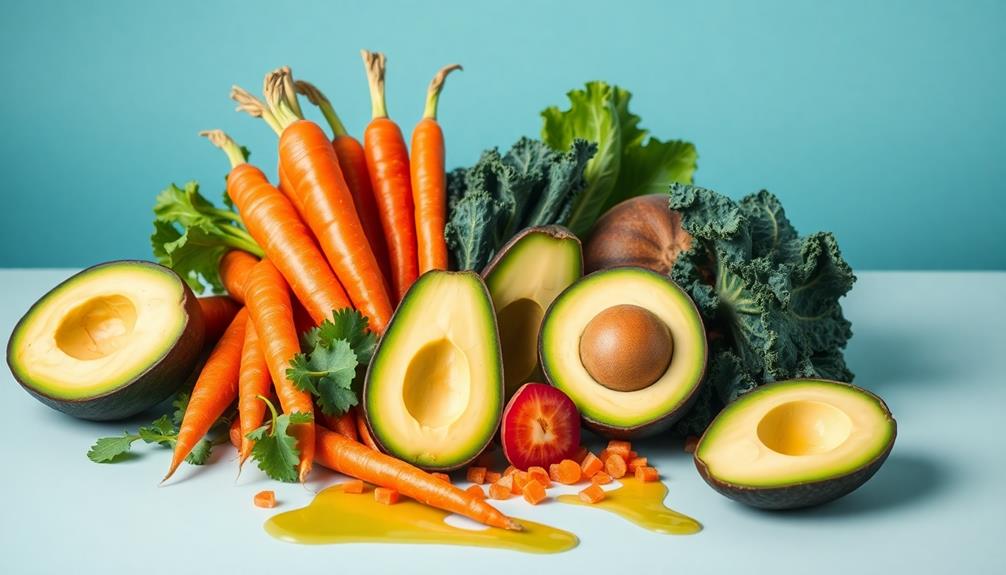
Carotenoids, found in colorful veggies like carrots and spinach, offer impressive health benefits, especially when paired with healthy fats.
Dishes like Mushroom Masala not only provide a rich source of carotenoids but also pair well with healthy oils, enhancing nutrient absorption.
By adding fats such as olive oil or avocado, you can boost the absorption of these nutrients considerably.
Cooking these vegetables can also enhance their bioavailability, making it easier for your body to reap their rewards.
Carotenoid Sources and Benefits
When you include healthy fats in your meals, you can greatly boost the benefits of carotenoid-rich foods like carrots, sweet potatoes, and spinach. For example, incorporating dishes like Nettle and Potato Soup can provide a nutrient-dense way to enjoy these vegetables.
Carotenoids are fat-soluble pigments that offer numerous health benefits, particularly for eye health. Consuming these vibrant vegetables with healthy fats, such as olive oil or avocado, enhances carotenoid absorption, increasing their bioavailability. Studies show that when you pair dietary fat with carotenoids, absorption can rise to 70%.
Carotenoids like beta-carotene and lutein are linked to improved vision and a reduced risk of age-related macular degeneration. So, when you prepare your meals, consider cooking methods like roasting or steaming. These techniques break down plant cell walls, making carotenoids easier to absorb, especially when combined with healthy fats.
Incorporating healthy fats in your nutrition not only boosts the absorption of these essential nutrients but also maximizes their health benefits. By prioritizing these combinations, you can enhance your overall well-being while savoring delicious, colorful dishes that support your vision and lower the risk of chronic diseases.
Role of Healthy Fats
Incorporating healthy fats into your meals is essential for revealing the full nutritional potential of carotenoid-rich foods. Carotenoids, found in colorful fruits and vegetables like carrots and spinach, are fat-soluble nutrients that require healthy fats for ideal absorption.
For instance, enjoying a dish like Nasi Tumpeng with a rich assortment of vegetables and healthy fats can greatly enhance your nutrient intake. When you combine these vibrant foods with sources of healthy fats, like avocado or olive oil, you can enhance the bioavailability of these nutrients by up to three to four times.
This food synergy not only boosts nutrient absorption but also plays a significant role in reducing the risk of chronic diseases, including cardiovascular conditions and certain types of cancer. By ensuring you include healthy fats in your meals, you maximize the health benefits of the carotenoids you consume.
Moreover, embracing dietary variety is key. Experiment with cooking methods, such as steaming or sautéing vegetables in oil, to improve carotenoid release and availability.
This approach not only makes your meals more delicious but also enriches your diet with essential nutrients. So, don't underestimate the power of healthy fats; they're important for revealing the full potential of the carotenoids that contribute to your overall health.
Cooking for Enhanced Absorption
Maximizing nutrient absorption goes hand in hand with cooking techniques that enhance the bioavailability of carotenoids. These fat-soluble compounds, found in whole foods like carrots and leafy greens, require healthy fats for ideal absorption.
For instance, incorporating dishes that feature healthy fats, such as Umeboshi in rice dishes, can complement the nutrient profile of your meals. Research shows that when you pair carotenoid-rich foods with healthy fats, like olive oil or avocado, you can considerably boost nutrient uptake—sometimes by 6-12 times compared to eating them alone.
Using cooking methods such as steaming or sautéing can further increase the bioavailability of carotenoids, making these nutrients more accessible for your body. For instance, drizzling cooked carrots with olive oil not only enhances the absorption of beta-carotene but also supports your eye health and skin health.
Additionally, adding fats to salads—think avocado or nuts—can lead to greater absorption of carotenoids, emphasizing the significance of food synergy in your meals.
Turmeric, Fat, and Black Pepper

Releasing the full potential of turmeric involves pairing it with black pepper and healthy fats. Turmeric's key active ingredient, curcumin, boasts impressive health benefits, particularly for reducing inflammation and fighting oxidative stress. This powerful compound is also celebrated in various traditional dishes, such as Muamba De Galinha, where spices enhance flavor while promoting health.
However, without the right companions, its absorption in your body is limited. By adding black pepper, you can boost curcumin's bioavailability by an astonishing 2000% thanks to piperine, which slows down curcumin's excretion.
To maximize these benefits, consider these tips:
- Use black pepper: A pinch can make a significant difference in curcumin absorption.
- Incorporate healthy fats: Olive oil or avocado enhances curcumin's fat-soluble nature, improving absorption.
- Cook with turmeric: Heating it in dishes like curries can further enhance its effectiveness.
When you combine turmeric with black pepper and fat, you reveal a powerful synergy that supports your health. This trio not only helps in alleviating arthritic pain but also promotes liver health.
Whole Foods and Nutrition
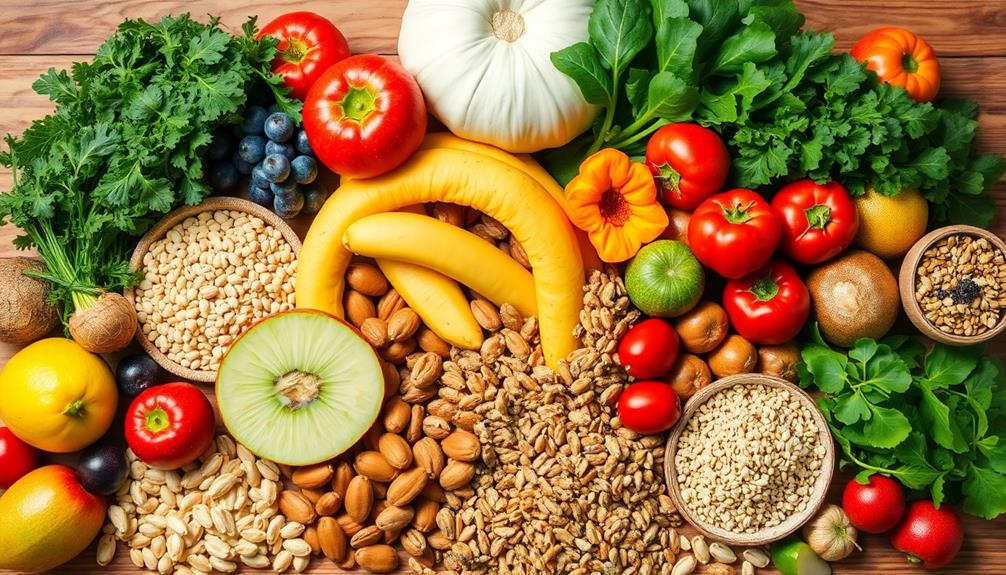
How can whole foods transform your nutrition? By incorporating nutrient-rich foods like fruits, vegetables, whole grains, beans, and nuts into your daily meals, you can enhance your overall health.
For instance, enjoying festive snacks like Graveyard Taco Dip can provide a delicious way to integrate beans and avocados into your diet. Nutrition research highlights that whole foods provide essential nutrients in their natural forms, promoting better absorption compared to processed options that often lack critical nutrients and fiber.
The concept of food synergy plays an essential role here, demonstrating how the interactions among various nutrients in whole foods can amplify health benefits. For example, combining carrots with a healthy fat like olive oil can greatly boost the absorption of beta-carotene, which is crucial for your body.
Additionally, a varied diet rich in whole foods helps maintain balanced dietary patterns, ensuring you receive a wide range of vitamins, minerals, and phytochemicals that support bodily functions and protect against chronic diseases.
Whole foods not only facilitate better nutrient bioavailability but also enhance the absorption of iron and other essential nutrients. Embrace whole foods for a transformative approach to your nutrition, optimizing your health outcomes and well-being.
Dietary Supplements Overview
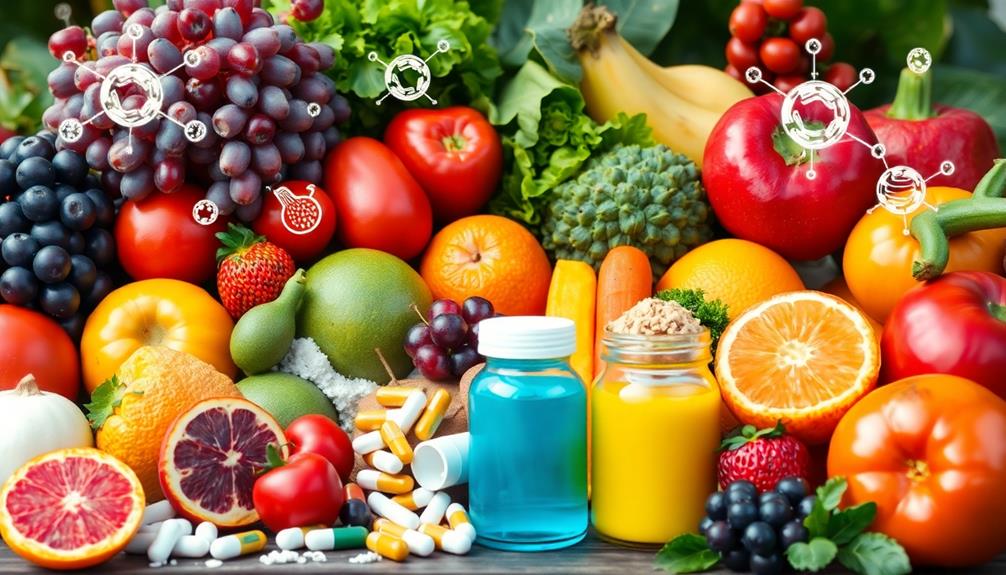
Dietary supplements have become an integral part of many people's health routines, often seen as a quick fix for nutritional gaps. However, while they can help in certain situations, they shouldn't replace whole foods, which provide a more thorough nutrient intake.
The dietary supplement industry has grown considerably, valued at about $23 billion in 2005, reflecting consumer interest. Yet, research shows mixed results regarding their effectiveness in preventing chronic diseases.
Here are a few key points to reflect on:
- Calcium and Vitamin D: Effective in supporting bone density.
- Mixed Outcomes: Some supplements, like vitamin E, have unclear benefits for cardiovascular disease.
- Regulatory Challenges: The 1994 Dietary Supplement and Health Education Act permits labeling with minimal nutrient amounts, but safety and quality often fall short.
Public health guidelines generally recommend focusing on whole foods to avoid deficiency diseases and excessive supplementation risks.
While dietary supplements can address specific deficiencies, it's crucial to prioritize a diet rich in whole foods for ideal health and well-being.
Mediterranean Diet Insights
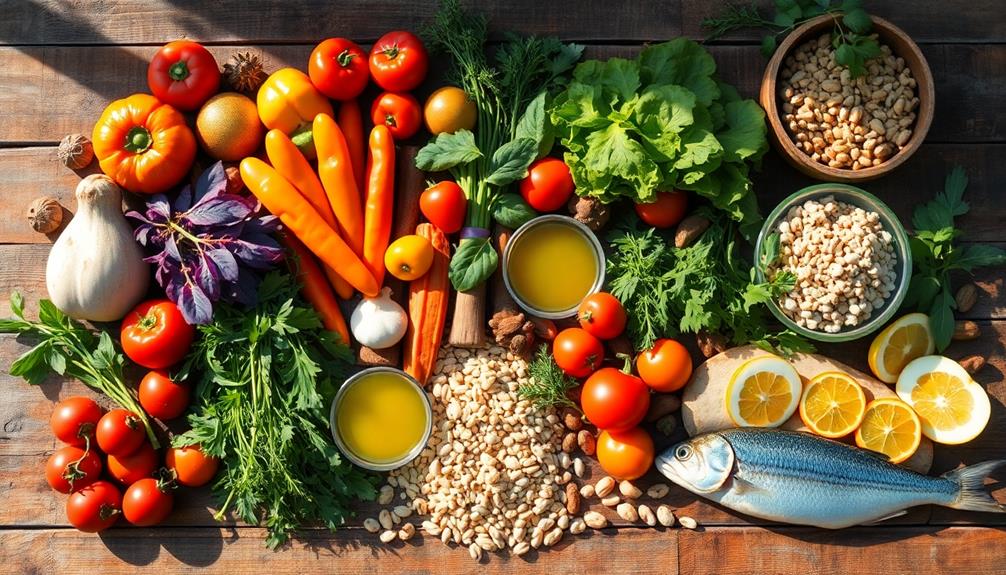
The Mediterranean diet offers a vibrant approach to eating that prioritizes whole, nutrient-dense foods. By focusing on fruits, vegetables, whole grains, legumes, nuts, and healthy fats like olive oil, you can harness the power of food synergy to enhance your health.
This diet is packed with antioxidants and phytochemicals, which play a vital role in reducing inflammation and preventing chronic diseases, including diabetes and certain cancers.
Research shows that populations adhering to the Mediterranean diet, such as those in the Seven Countries Study, experience lower levels of serum cholesterol and reduced rates of heart disease. By incorporating fish and seafood while limiting red meat and processed foods, you support your cardiovascular health and improve overall well-being.
Moreover, the Mediterranean diet not only promotes health but also contributes to longevity. Studies indicate that those who follow this dietary pattern face a 20% lower risk of mortality compared to individuals on less balanced diets.
Frequently Asked Questions
What Is the Nutrient Synergy Theory?
Nutrient synergy theory suggests that certain foods work better together, enhancing nutrient absorption and health benefits. By combining specific nutrients, you can maximize their effects, leading to improved overall nutrition and well-being in your diet.
What Is the Science of Food Combination?
You know what they say, "variety is the spice of life." The science of food combination explores how different foods interact, enhancing nutrient absorption and health benefits, making your meals more powerful and nutritious when paired wisely. This goes beyond just taste; the psychology of food presentation also plays a crucial role in how appealing and satisfying a meal can be. A beautifully arranged plate can stimulate your appetite and even influence how healthy or indulgent you perceive the dish to be. Ultimately, combining flavors, textures, and visual elements thoughtfully creates a truly enriching dining experience.
What Is the Healthiest Combination of Food?
The healthiest combination of food includes leafy greens with citrus for iron absorption, tomatoes with olive oil for antioxidants, and yogurt with fruits for gut health. These pairings enhance nutrient uptake and support overall well-being.
What Is Synergy in Nutrition?
Synergy in nutrition refers to how different foods work together to enhance nutrient absorption and effectiveness. When you combine certain foods, like vitamin C with iron-rich sources, you greatly improve your overall nutrient intake and health benefits.
Conclusion
In the garden of nutrition, food synergy acts like a harmonious duet, where each ingredient amplifies the other's benefits. By pairing nutrient-rich foods, you're not just feeding your body; you're cultivating a vibrant landscape of health. Whether it's iron with vitamin C or the magic of turmeric and fat, these combinations elevate your meals and well-being. Embrace these powerful pairings, and watch your nutritional garden flourish! Remember, together, foods can achieve more than they can alone.

